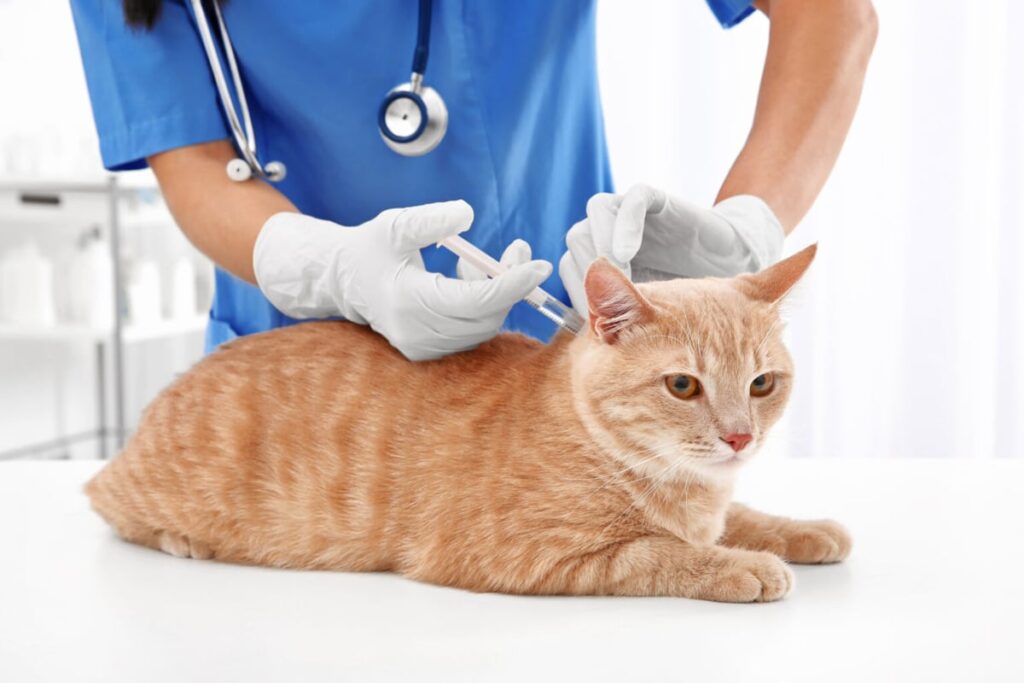
Vaccination
To protect the health of cats and dogs, vaccination is an essential part of disease prevention. In Hong Kong, all dogs aged five months and above are required to receive vaccinations to prevent rabies, as well as to protect against various viral and bacterial diseases. Dogs aged 12 weeks (or 3 months) and above are eligible to receive the rabies vaccination, which should be administered every 3 years along with a renewal of the dog license. This is especially important for puppies and kittens, as their immune systems are not yet fully developed. Early vaccination allows pets to safely interact with other animals and establish socialization. Furthermore, it is necessary for both puppies, kittens, and adult cats and dogs to receive vaccinations to prevent various illnesses and ensure their overall health. Vaccinations protect pets from diseases such as canine distemper, kennel cough, feline panleukopenia, and cat flu, among others. Vaccinations are crucial for the health and well-being of pets.
The Importance of Pet Vaccination for Health and Safety
Without proper vaccination, pets may contract diseases and easily spread them to other animals and even humans. Additionally, dogs that have not received the rabies vaccine may be subject to mandatory quarantine by authorities, causing inconvenience to both them and their owners. To ensure the health and happiness of pets, pet owners should take them for vaccinations. Not only does this protect pets from diseases, but it also safeguards other animals and humans from the spread of illnesses.
We offer regular preventative health checks and services. Our experienced vets can provide you with advice and recommendations regarding vaccinations and general preventative health care.
Regular preventative health care includes:
- DHPPiL Vaccine - Among the various vaccines for dogs, the DHPPiL vaccine is particularly important as canine distemper, parvovirus, and leptospirosis are common diseases in Hong Kong. Canine distemper and parvovirus are common diseases found in puppies sold at pet stores, while dogs that have lived or played in the hills or countryside may be at risk of contracting leptospirosis. Puppies should receive their first vaccination between 6-8 weeks, followed by the second and third vaccinations between 10-12 and 14-16 weeks, respectively. Afterwards, annual vaccinations are recommended to maintain protection against preventable diseases.
- FVRCP Vaccine - It is a vaccination for cats that can protect against feline viral rhinotracheitis, calicivirus, and panleukopenia. Cats are typically vaccinated with their first shot at 8 weeks of age, followed by additional vaccinations at 12 weeks and 16 weeks, respectively. Afterwards, annual vaccinations are recommended to maintain protection against preventable diseases.
- Lepto Vaccine - There are currently two types of vaccines available to prevent leptospirosis, one of which is included in the DHPPiL vaccine that dogs receive annually. However, this vaccine may not be fully effective against local strains of leptospirosis. Another option is the Lepto vaccine, which can protect against multiple serogroups of leptospirosis. After receiving this vaccine, dogs develop antibodies that enhance their immunity against leptospirosis. Although there is still a risk of dogs contracting leptospirosis, the chances of successful recovery are higher as compared to those who have not received the Lepto vaccine.
- Rabies Vaccination
- Bordetella Vaccination
- Heartworm Prevention
- Dental Hygiene
- Internal Parasite Control
- External Parasite Control

 2713 4155
2713 4155




